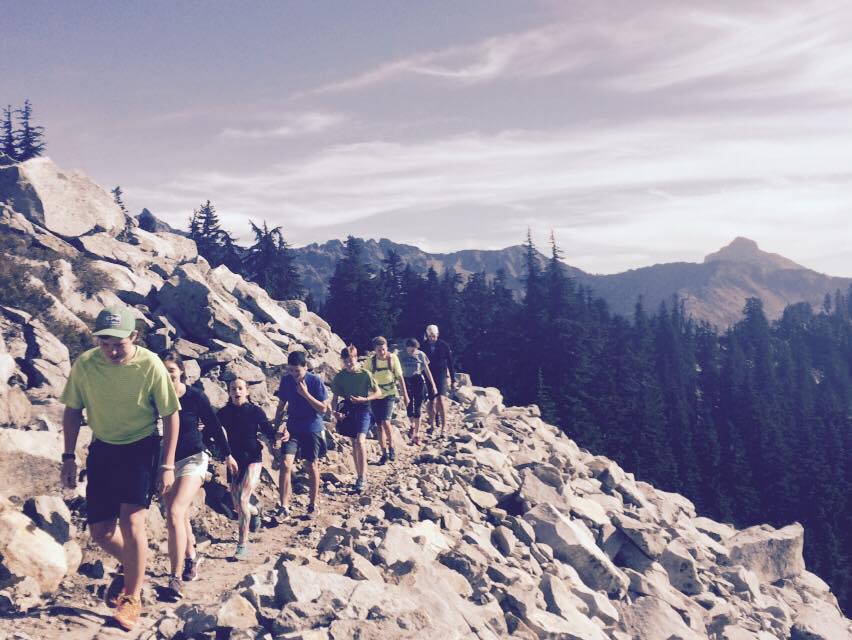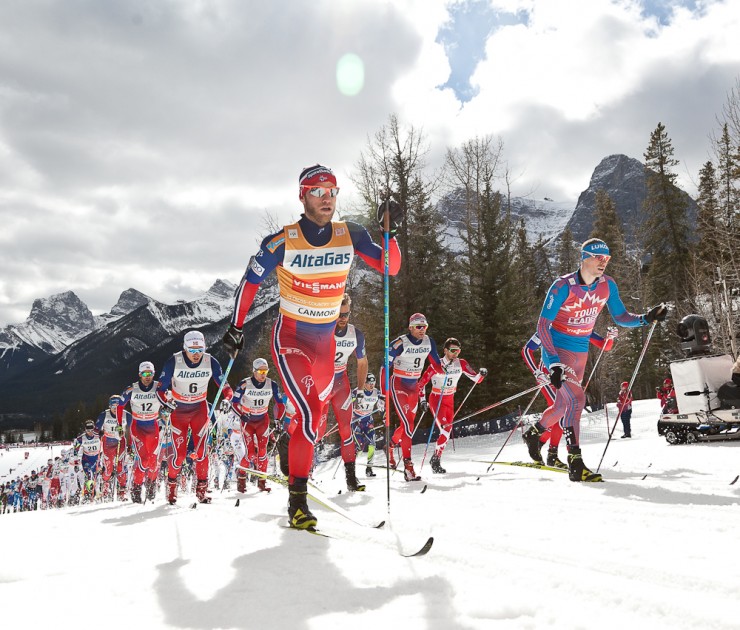
CANMORE, Alberta — The sixth stage of the Ski Tour Canada (STC), the men’s 30-kilometer skiathlon on Wednesday, was a perfect storm of altitude, massive climbs and warm conditions. Some skiers faltered, moving back in the Tour’s overall standings, others took advantage of the make-or-break stage and seized the day.
Entering Wednesday’s race, Martin Johnsrud Sundby of Norway sat in fourth overall, 1:55.3 minutes behind STC leader, Sergey Ustiugov of Russia. Afterward, he had cut that nearly two minute gap in half.
The overall World Cup leader as well as Distance World Cup leader, Sundby won the skiathlon, which moved him up to third in the STC standings, 1:04.5 behind Ustiugov — who still wears the red bib as the Tour’s overall leader.
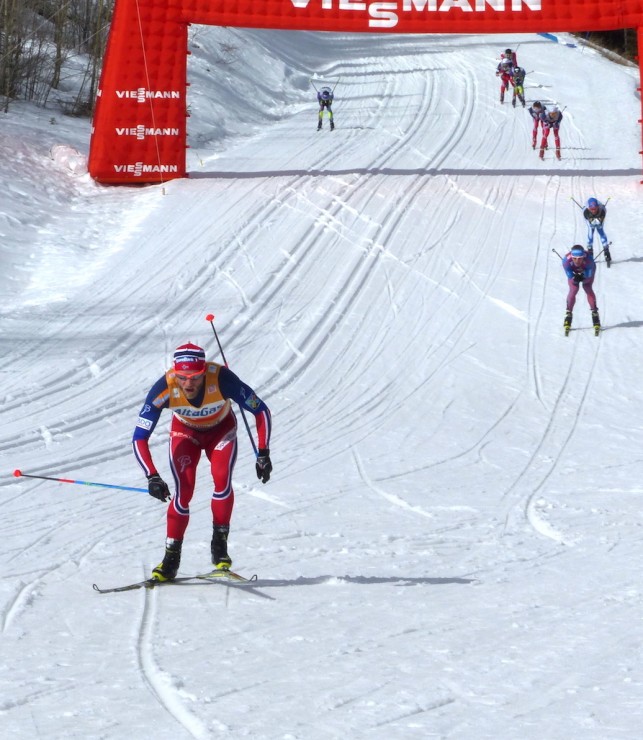
A full-on sprint down the finishing stretch, which would determine the podium, resulted in Sundby beating Ustiugov by 2.8 seconds, throwing his arms up at the line as he did so. Finland’s Matti Heikkinen was 3.7 seconds back in third after recovering from a back injury and a subsequent slow start to the season.
Sundby’s finishing time of 1:16:29.7 hours, set the baseline from which other Tour contenders were compared. Ustiugov withstood the Sundby challenge. Others weren’t so lucky.
After placing sixth in the Stage 5 classic sprint, another Norwegian, Petter Northug Jr. remained second in the Tour, just 19.5 seconds behind Ustiugov. On his best days, Northug could likely diminish that margin, but that wasn’t the case for the skiathlon. Northug placed 11th (+17.6) on Wednesday, and lost valuable time to Ustiugov. The wily Norwegian is still second overall, but now trails the 23-year-old Russian — the World Cup’s newest all-around star — by 47.3 seconds..
“He has shown really good shape the last races and [Ustiugov] proved again that he is really strong,” Northug told FasterSkier after the skiathlon. “And he is now the favorite to win this tour, and yeah, for me it is just try to attack everyday.”
Two stages and 30 k total remain; a 15 k freestyle individual start on Friday and a 15 k classic pursuit on Saturday. Two days for Northug’s attack to manifest and two days for that 47.3 seconds to vaporize.
“The strategy is to try and attack on Friday and we will see what happens,” Northug said.
With the individual start on Friday and a pursuit on Saturday, formats where team tactics aren’t favorable, Northug admitted the STC crown will be his alone to earn.
“It’s two individual races. It is just to do the work by yourself,” Northug said.
Emil Iversen, another Norwegian who felt the effects of Canmore’s über climbs during the skiathlon, fell back in the standings. Iversen finished in 17th, 1:28.8 behind Sundby. Iversen had entered the race in third overall (+1:10.1), but 30 k of combined classic and skate skiing later, and he dropped to fifth (+2:53.1).
Iversen’s misfortune was good for another skier, namely Canada’s Alex Harvey, who leapfrogged from fifth to fourth overall (+2:51.0).
Harvey benefitted from what most racers described was an absolute grind of a course.
“It was a tough day especially in the skate,” Harvey said in a post-race interview. “Martin started pushing hard from the beginning. I was hoping that one of the guys in front of me would have a rough day and it happened to be Iversen. It moved me up to fourth place. The top three is far now, there is not much I can do about it. They can always have a really bad day but that’s beyond my control. So now I am just focusing on staying in the the top five.”
A Sum of Its Parts
The STC has eight stages over 12 days. And as part of the whole, Stage 6 was a doozy. From the outset of the classic leg, skiers were popped off the back, others were mired in the middle, while a select crew up front dealt with a searing pace.
Sundby played it smart near the front. He surged when needed and sat quiet in the draft at times. He won two 15-second time bonuses during the classic leg and another during the skate leg.
“It was a tough race actually, tough conditions,” Sundby said in the press conference.
For most of the classic leg, a large group of about 30 skiers remained together.
“Usually in these tracks in Canmore we are one big pack. It is difficult to ski ahead,” Sundby commented.
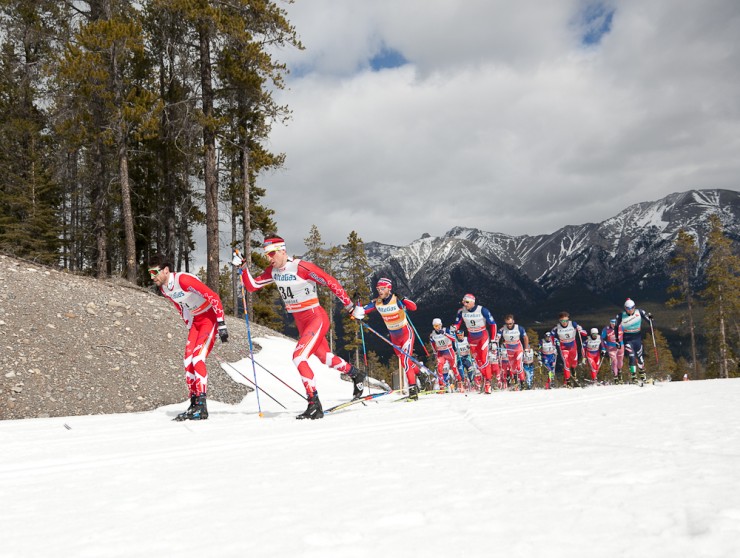
On the third of four classic laps, up a massive-and-decisive climb, Canadian World Cup Team members Ivan Babikov and Harvey set the tempo up front.
“Babikov went ahead of Alex,” Sundby told FasterSkier when asked about the Canadians’ move.
At first glance, it appeared the duo were possibly slowing things down, perhaps keeping Sundby and company from breaking things apart. Sundby said he thought that was not the case.
“I think the strategy was to keep a high speed,” Sundby said to FasterSkier. “I think Babikov offered to Alex there to increase the speed. Maybe some of the other guys felt it was too hard, fell off. It was difficult to pick up too much seconds in the classic track today, so they did an effort. It wasn’t able to get rid of too many guys.”
“We didn’t plan,” Harvey said after the race. “But when you see one of your teammates in the front, I was telling him where to go — go for the fast snow in the classic over the top and of course, go outside. I was shouting to him like what I thought was the best line. We tried to help each other.”
“We didn’t plan, but when you see one of your teammates in the front, I was telling him where to go … We tried to help each other.” — Alex Harvey on leading the pack in Wednesday’s skiathlon with Canadian teammate Ivan Babikov
Canadian Head Coach Justin Wadsworth explained the team’s strategy was plastic. In other words, they should see how the race plays out.
“We didn’t talk about that at all,” Wadsworth said of Harvey and Babikov leading. “Generally if the skis are good and you are feeling good and the pace doesn’t feel crazy, I think it’s actually not a bad place to ski. I am sure they were chilling out and just staying out of trouble, too, with a pack of thirty guys … anything can happen. You clip a pole, get hooked on a downhill, it’s not a bad plan to be skiing out in front.”
Sundby told FasterSkier that gaining time on the classic leg was a burden he chose not to pursue.
“Certainly the conditions today, it’s not easy to be first, it’s better to have a bigger speed from behind,” he said. “In the classic tracks, it’s 1.2 kilometer to the top of the big climb and from there it’s almost downhill to the stadium. If you have some seconds on the top, you always get flashed by everyone from behind. So it’s a difficult track to increase so much time.”
If you were following the race and the time splits with it, Sundby’s words rang true. A big group of skiers headed into the transition at 15 k vying for the lead. As the skate leg began, 10.3 seconds separated first from 27th place.
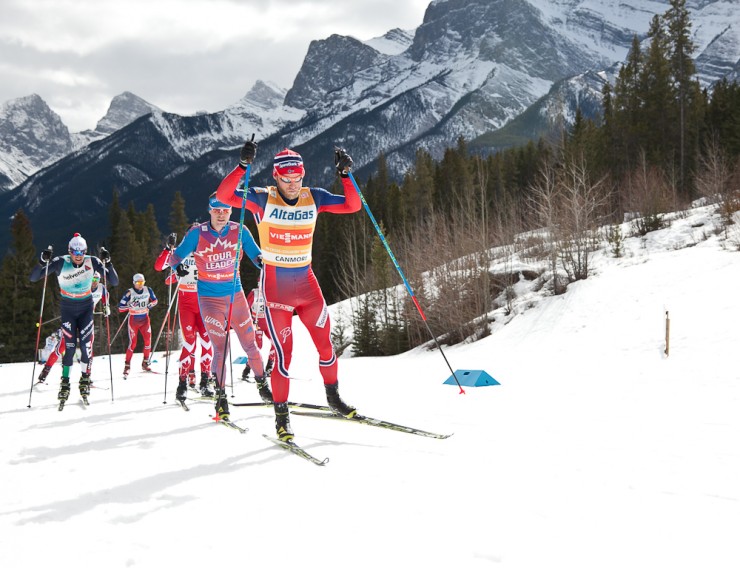
The skate leg broke things apart further. Skier by skier, racers were winnowed from the front pack.
By 20 k in and 10 k remaining in the skate portion, a pack of 12 skiers remained up front. They included the three skiers that would eventually reach the podium — Sundby, Ustiugov, and Heikkinen — but also Norway’s Finn Hågen Krogh, Didrik Tønseth, Hans Christer Holund, and Northug. Two skiers sporting Canada’s red-and-white and maple leaf, Harvey and Babikov excited the home crowd with their possibilities.
With two k to go, those twelve skiers kept together — no one playing the roulette wheel of chances and sprinting ahead early. In the final moments, the man with the yellow bib marking his lead in the World Cup overall, Sundby, defined the day as his with the win.
“I thought that after the sprint yesterday that Sergey was going to be a bit more tired,” Sundby said in the press conference. “But he is so strong this tour and it’s impossible to gain too much seconds on him. I am happy about the race, a good team performance. We had a lot of Norwegian guys up there.
“We have only 30 k’s left. One race on Friday, one on Saturday,” Sundby added. “Everything is possible. But I need an amazing day on Friday, I think. Fifteen k skating is going to be decisive. I need a miracle, but it’s still possible to win this.”
“I need a miracle, but it’s still possible to win this.” — Norway’s Martin Johnsrud Sundby, third in the Ski Tour Canada, 1:04.5 behind Russia’s Sergey Ustiugov in first, with two stages to go
Ustiugov was calm and succinct in light of his lead.
“It was a good race for me,” he told FIS afterward. “I picked up a few bonus seconds. I am still in a lead of the Ski Tour. There are two important competitions left ahead and I have to stay focused.”
In another post-race interview, Finland’s Heikkinen told FIS he was satisfied with his result and his long return to form.
“It has a been a while since I was on the podium,” said the 32-year-old Heikkinen, who last placed third in a World Cup skiathlon in January 2015 in Rybinsk, Russia. “I had problems with my back in the autumn so it is great to be third today. I have had good results at the Ski Tour Canada. It is a positive sign for me. I need some good months of summer training and I believe I will be back 100 percent next winter.”
The Home Team
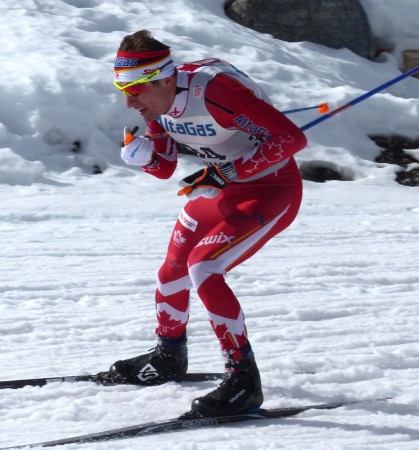
The stats reveal a solid day for the Canadian men: Harvey finished seventh (+7.6), Babikov captured a season-best 10th (+16.9), Graeme Killick (Canadian Senior Development Team) notched 19th (+1:34.2) to tie a career best, and Devon Kershaw (Canadian World Cup Team) placed 24th (+2:14.2).
“Anytime you get two in the top 10 it’s good and three in the top 20,” Wadsworth said. “So it’s definitely probably the best team distance race of the year today. It was good, I was really happy with it all around. I’m sure Alex wishes he were a little bit further ahead at the finish, but still pretty solid for the overall.”
Knowing your assets and mining them for success is something the Canadians saw play out on Wednesday.
“We know these courses really well,” Wadsworth said of the team’s home base, with the high-performance center (Bill Warren Training Centre) nearly adjacent to the Canmore Nordic Centre.
“Especially how the classic course is so tough here and we did a lot of intensity on it. We skipped Lahti [the last weekend of European World Cup races] and did a pre-camp. We did a couple of intensity sessions right on the courses and focused how to technically ski the big uphill and make sure they are standing up, getting really good pressure on the ball of the foot … So just small things like that. I feel like we have an advantage and we have really trained focusing this whole year on these, mainly on these four races here in Canmore.”
That focus paid dividends and Babikov was a huge beneficiary.
“I know this course like the back of my hand,” Babikov said. “I’ve been training on this, like, summer and winter every year. I just tried to stay with the group, tried to control the pace and fortunately I had a really good classic leg. On the skate leg, at the end my arms started cramping up, but I am super happy with the effort and the results.”
Babikov improved to 17th overall (+7:45.7) in the Tour.
Here in Canmore, it’s been showtime for the Canadians.
“The real money starts getting paid out here in Canmore with today as the crux,” Wadsworth said.
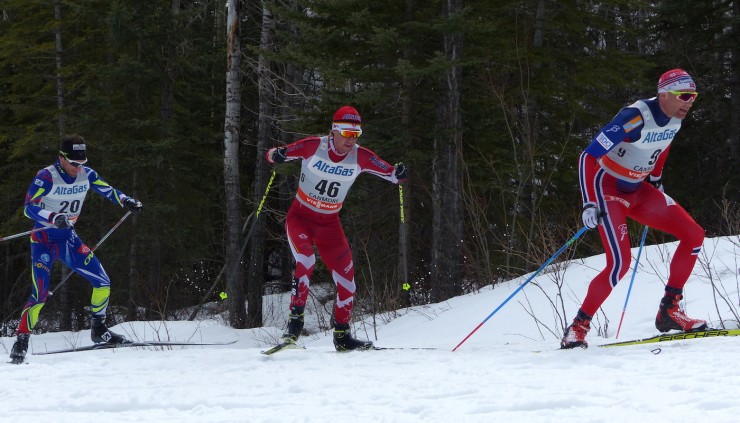
Matching his best career World Cup result was 27-year-old Killick.
“It was good, a really a fun course on a beautiful day,” Killick said. “We had great skis as usual. It was just really fun to ski with such a good group of guys. I started out a little slow as I planned and kind of made up a few positions throughout the race. So pretty happy with my result overall.”
Killick moved into 27th overall (+10:34.1). “I didn’t expect that starting in 46th today,” he said. “It’s great news and good to be coming back every day a little bit from Montreal. That was kind of disaster for me. It is awesome.”
Kershaw was the fourth North American in the points. His 24th place on a brutal day has him 18th overall in the STC (+8:00.3).
At the exchange Kershaw remained in the game, only 4.8 seconds out.
“I felt really good in the classic,” Kershaw said. “My legs cramped on me pretty bad right after the exchange. So the skate was really difficult for me. But it was a great day for the team, so I am happy for the other guys.”
He explained that cramping so early in the skate was a problem he had to gradually temper.
“It’s hard mentally, but you have to try and get it out of your mind. That’s when skiing proper technically or as best as you can to limit the losses is important. The last 15 k I really struggled, it’s too bad because I felt good today.”
Two stages to go and Kershaw is looking ahead.
“It will be a battle,” he said. “I am really looking forward to Saturday. The 15 k classic is my favorite event and I’m going to be really tough in the 15 k skate. Hopefully I can get a ride or something because this course is punishing.”
The skiathlon was a setback for the U.S. None of it’s men finished in the points: the top 30.
“Rough for the guys,” U.S. Ski Team Head Coach Chris Grover said. “To have a 30 k skiathlon at this point so far into a tour and to have such soft conditions on such a hard course made it tough … Noah not happy with his race. Erik not happy with his race. I don’t think any of the guys that did move through today were really happy about their performance. But two days from now is a new day and we can have some good skate races”
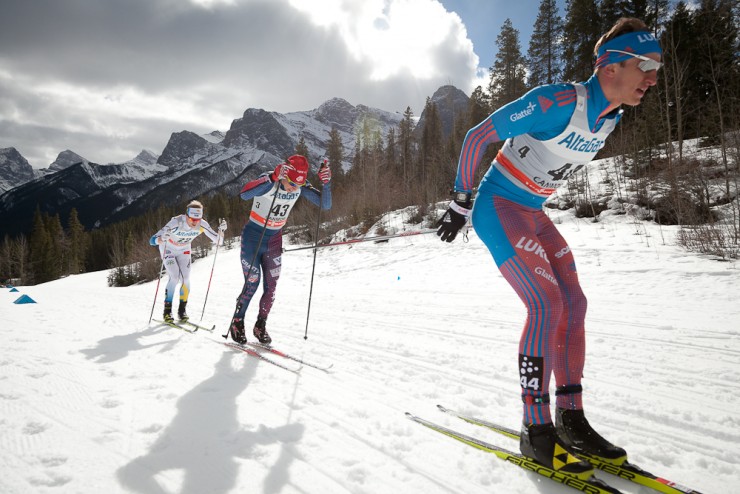
Noah Hoffman posted the best U.S. men’s result in 35th place (+4:21.9).
“Really hard course. I was hoping for better honestly, but I don’t know, two more opportunities,” Hoffman noted. “It’s one of the harder courses we race all winter. It’s very comparable with the hardest courses like Kuusamo and Sochi and Val di Fiemme and Oslo. I mean, this is a world-class venue, a world-class course and I love being here.”
Hoffman said he stayed true to his plan and didn’t redline early on.
“I executed my plan of staying within myself on the classic and had pretty good energy left on the skate. Overall I just wasn’t where I wanted to be, but I skied the way I wanted to,” he said. “Individual start skate race is obviously a great opportunity for me and I’m looking forward to that on a really hard course.”
Erik Bjornsen began the day optimistically in bib 31. But his first words in his post-race interview tell his story.
“It was bad,” Bjornsen said after placing 49th. “I just didn’t feel good and was out of it from the beginning. It was hard and I was moving slow. I can ski with those guys, I just wasn’t on it today. I can’t really explain why.”
Recently Bjornsen has been on a streak popping top 30’s.
“The last month and a half has been great for me, so maybe I’m not ready for the altitude or something, I don’t know,” Bjornsen said. “I started in 31st so it’s been a great Tour for me so far. I posted my best sprint race in Quebec so I think that I’m a strong Tour skier. I went through hand surgery last year and that maybe has something to do with the inconsistency this year, but I just hope to get stronger year to year and I’d love to be a Tour skier in the future.”
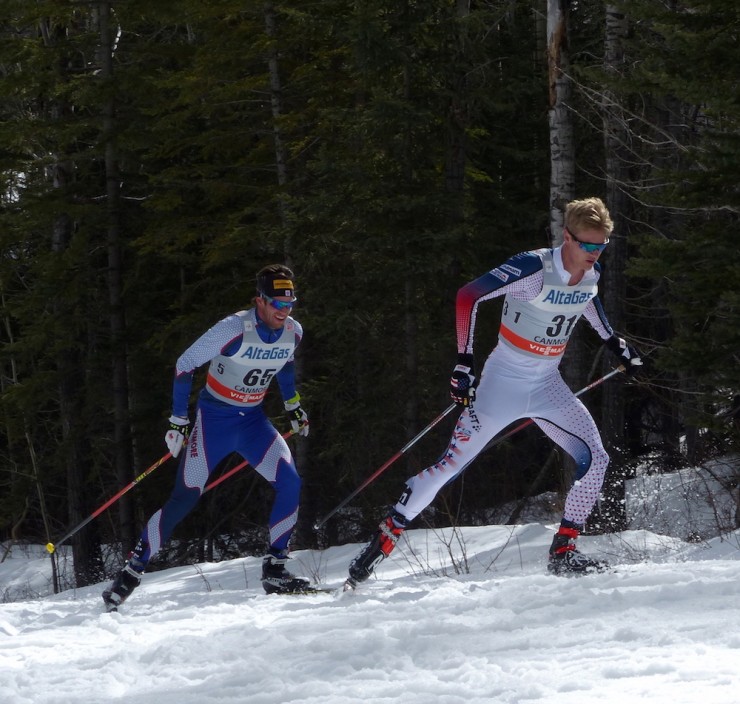
For the Americans, Scott Patterson, of Alaska Pacific University (APU) was 55th, and Tad Elliott (Ski & Snowboard Club Vail) was 58th and will go on to race the remaining two stages. Eric Packer (65th), Reese Hanneman (67th) and Brian Gregg (68th) were lapped, thus ending their Tour.
Grover spoke of the disappointment those lapped skiers feel.
“The tough thing is that the finish of the classic course was the same as the finish of the skate course, and that last, whatever 0.8 kilometer, one kilometer, is together, so they stopped those guys before they were even able to switch over to skate,” Grover said. “Really disappointing for those guys.”
Seven other Canadians stayed in the Tour, with Kevin Sandau, of the Alberta World Cup Academy (AWCA) in 40th, Lenny Valjas (Canadian World Cup Team) in 46th, Knute Johnsgaard (AWCA/CNST) in 47th, Russell Kennedy (Canmore Nordic) in 52nd, Andy Shields (NDC Thunder Bay) in 53rd, Michael Somppi (NDC Thunder Bay) in 54th, and Patrick Stewart-Jones (AWCA) in 57th.
Bob Thompson (NDC Thunder Bay) was lapped for Canada, ending his run in the Tour and placing 62nd on the day. Simon Lapointe (Skinouk) did not start.
Racing continues Friday with Stage 7 of the STC, an individual 15 k skate.
— Gabby Naranja, Gerry Furseth, Alex Kochon and Harald Zimmer contributed
Results | Tour standings (through Stage 6)
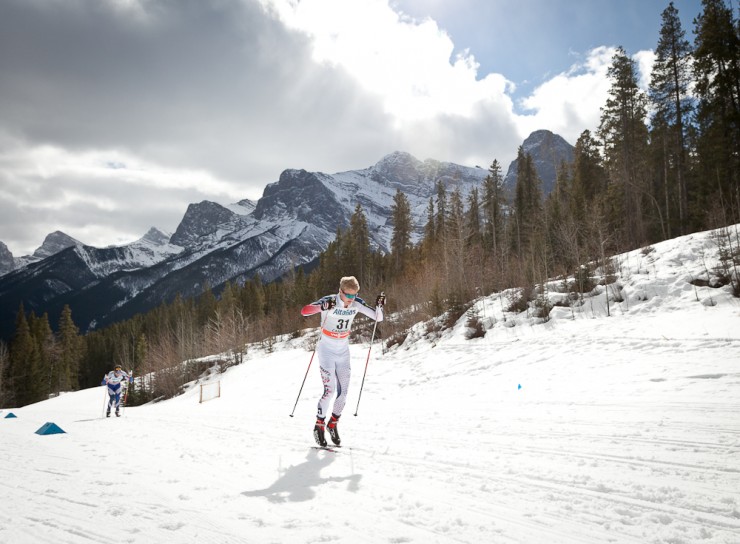
Jason Albert
Jason lives in Bend, Ore., and can often be seen chasing his two boys around town. He’s a self-proclaimed audio geek. That all started back in the early 1990s when he convinced a naive public radio editor he should report a story from Alaska’s, Ruth Gorge. Now, Jason’s common companion is his field-recording gear.

